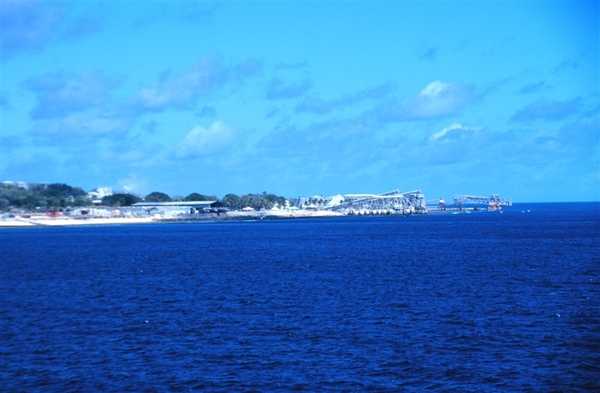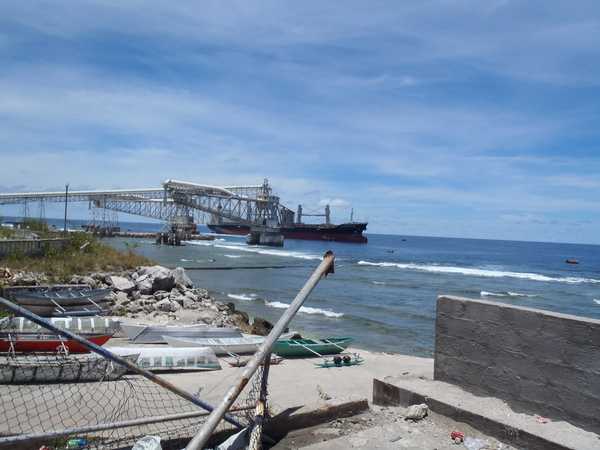Nauru - NR - NRU - NRU - Australia and Oceania
Last updated: January 21, 2026
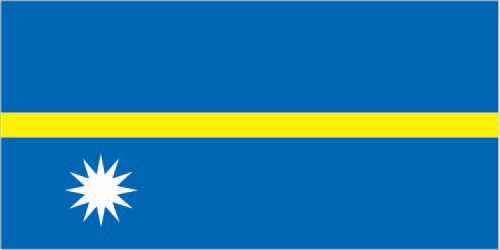
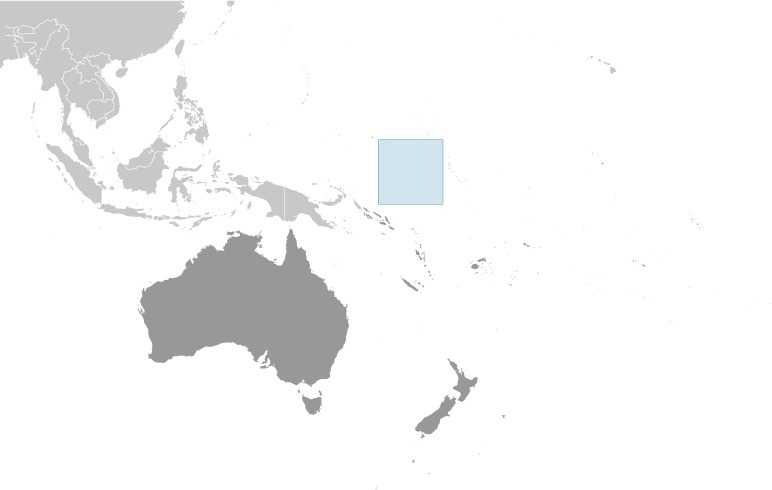
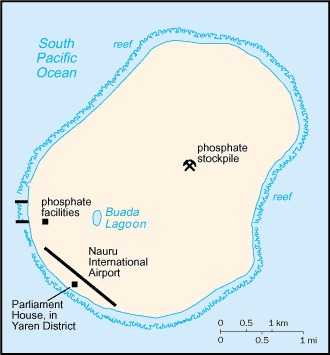
Nauru Images
Nauru Factbook Data
Diplomatic representation from the US
embassy: the US does not have an embassy in Nauru; the US Ambassador to Fiji is accredited to Nauru
Age structure
0-14 years: 29.6% (male 1,493/female 1,433)
15-64 years: 66% (male 3,220/female 3,309)
65 years and over: 4.4% (2024 est.) (male 143/female 294)
15-64 years: 66% (male 3,220/female 3,309)
65 years and over: 4.4% (2024 est.) (male 143/female 294)
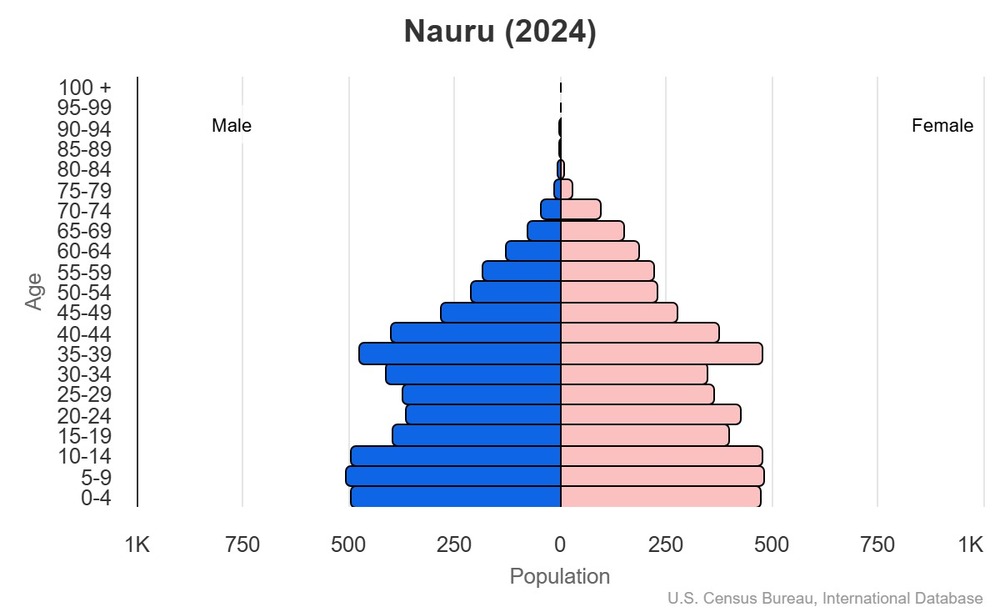
This is the population pyramid for Nauru. A population pyramid illustrates the age and sex structure of a country's population and may provide insights about political and social stability, as well as economic development. The population is distributed along the horizontal axis, with males shown on the left and females on the right. The male and female populations are broken down into 5-year age groups represented as horizontal bars along the vertical axis, with the youngest age groups at the bottom and the oldest at the top. The shape of the population pyramid gradually evolves over time based on fertility, mortality, and international migration trends.
For additional information, please see the entry for Population pyramid on the Definitions and Notes page.
For additional information, please see the entry for Population pyramid on the Definitions and Notes page.
Geographic coordinates
0 32 S, 166 55 E
Sex ratio
at birth: 1.04 male(s)/female
0-14 years: 1.04 male(s)/female
15-64 years: 0.97 male(s)/female
65 years and over: 0.49 male(s)/female
total population: 0.96 male(s)/female (2024 est.)
0-14 years: 1.04 male(s)/female
15-64 years: 0.97 male(s)/female
65 years and over: 0.49 male(s)/female
total population: 0.96 male(s)/female (2024 est.)
Natural hazards
periodic droughts
Area - comparative
about 0.1 times the size of Washington, D.C.
Background
By 1000 B.C., Micronesian and Polynesian settlers inhabited Nauru, and the island was divided among 12 clans. Nauru developed in relative isolation because ocean currents made landfall on the island difficult. As a result, the Nauruan language does not clearly resemble any other in the Pacific region. In 1798, a British mariner was the first European to spot the island and by 1830, European whalers used Nauru as a supply stop, trading firearms for food. A civil war in 1878 reduced the population by more than a third. Germany forcibly annexed Nauru in 1888 by holding the 12 chiefs under house arrest until they consented to the annexation. Phosphate was discovered in 1900 and was heavily mined, although Nauru and Nauruans earned about one tenth of one percent of the profits from the phosphate deposits.
Australian forces captured Nauru from Germany during World War I, and in 1919, it was placed under a joint Australian-British-New Zealand mandate with Australian administration. Japan occupied Nauru during World War II and used its residents as forced labor elsewhere in the Pacific while destroying much of the infrastructure on the island. After the war, Nauru became a UN trust territory under Australian administration. In 1962, recognizing the phosphate stocks would eventually be depleted, Australian Prime Minister Robert MENZIES offered to resettle all Nauruans on Curtis Island in Queensland, but Nauruans rejected that plan and opted for independence, which was achieved in 1968. In 1970, Nauru purchased the phosphate mining assets, and income from the mines made Nauruans among the richest people in the world. However, a series of unwise investments led to near bankruptcy by 2000. Widespread phosphate mining officially ceased in 2006.
As its economy faltered, Nauru briefly tried to rebrand itself as an offshore banking haven, an initiative that ended in 2005, and the country made a successful bid for Russian humanitarian aid in 2008. In 2001, Australia set up the Nauru Regional Processing Center (NRPC), an offshore refugee detention facility, paying Nauru per person at the center. The NRPC closed in 2008 but reopened in 2012. The number of refugees steadily declined after 2014, and in 2020, the remaining people were moved to Brisbane, Australia, effectively shuttering the NRPC. However, in 2023, Australia agreed to continue funding NRPC for two years and restarted settling asylees in the center in mid-2023. The center remains the Government of Nauru’s largest source of income.
Australian forces captured Nauru from Germany during World War I, and in 1919, it was placed under a joint Australian-British-New Zealand mandate with Australian administration. Japan occupied Nauru during World War II and used its residents as forced labor elsewhere in the Pacific while destroying much of the infrastructure on the island. After the war, Nauru became a UN trust territory under Australian administration. In 1962, recognizing the phosphate stocks would eventually be depleted, Australian Prime Minister Robert MENZIES offered to resettle all Nauruans on Curtis Island in Queensland, but Nauruans rejected that plan and opted for independence, which was achieved in 1968. In 1970, Nauru purchased the phosphate mining assets, and income from the mines made Nauruans among the richest people in the world. However, a series of unwise investments led to near bankruptcy by 2000. Widespread phosphate mining officially ceased in 2006.
As its economy faltered, Nauru briefly tried to rebrand itself as an offshore banking haven, an initiative that ended in 2005, and the country made a successful bid for Russian humanitarian aid in 2008. In 2001, Australia set up the Nauru Regional Processing Center (NRPC), an offshore refugee detention facility, paying Nauru per person at the center. The NRPC closed in 2008 but reopened in 2012. The number of refugees steadily declined after 2014, and in 2020, the remaining people were moved to Brisbane, Australia, effectively shuttering the NRPC. However, in 2023, Australia agreed to continue funding NRPC for two years and restarted settling asylees in the center in mid-2023. The center remains the Government of Nauru’s largest source of income.
Environmental issues
limited natural freshwater resources; effects of intensive phosphate mining that left the central 90% of Nauru a wasteland; air and water pollution from cadmium residue, phosphate dust, and other contaminants; rising sea levels
International environmental agreements
party to: Biodiversity, Climate Change, Climate Change-Kyoto Protocol, Climate Change-Paris Agreement, Comprehensive Nuclear Test Ban, Desertification, Hazardous Wastes, Law of the Sea, Marine Dumping-London Convention, Ozone Layer Protection, Whaling
signed, but not ratified: none of the selected agreements
signed, but not ratified: none of the selected agreements
Exports - commodities
fish, phosphates (2023)
note: top export commodities based on value in dollars over $500,000
note: top export commodities based on value in dollars over $500,000
Exports - partners
Thailand 78%, Philippines 11%, NZ 5%, Japan 1%, Canada 1% (2023)
note: top five export partners based on percentage share of exports
note: top five export partners based on percentage share of exports
Administrative divisions
14 districts; Aiwo, Anabar, Anetan, Anibare, Baitsi, Boe, Buada, Denigomodu, Ewa, Ijuw, Meneng, Nibok, Uaboe, Yaren
Agricultural products
coconuts, tropical fruits, pork, eggs, pork offal, pork fat, chicken, papayas, vegetables, cabbages (2023)
note: top ten agricultural products based on tonnage
note: top ten agricultural products based on tonnage
Military and security forces
no regular military forces; Nauru Police Force
Budget
revenues: $199.74 million (2020 est.)
expenditures: $157.86 million (2020 est.)
note: central government revenues (excluding grants) and expenditures converted to US dollars at average official exchange rate for year indicated
expenditures: $157.86 million (2020 est.)
note: central government revenues (excluding grants) and expenditures converted to US dollars at average official exchange rate for year indicated
Capital
name: no official capital; government offices in the Yaren District
time difference: UTC+12 (17 hours ahead of Washington, DC, during Standard Time)
time difference: UTC+12 (17 hours ahead of Washington, DC, during Standard Time)
Imports - commodities
ships, titanium ore, refined petroleum, plastic products, other foods (2023)
note: top five import commodities based on value in dollars
note: top five import commodities based on value in dollars
Climate
tropical with a monsoonal pattern; rainy season (November to February)
Coastline
30 km
Constitution
history: effective 29 January 1968
amendment process: proposed by Parliament; passage requires two-thirds majority vote of Parliament; amendments to constitutional articles, such as the republican form of government, protection of fundamental rights and freedoms, the structure and authorities of the executive and legislative branches, also require two-thirds majority of votes in a referendum
amendment process: proposed by Parliament; passage requires two-thirds majority vote of Parliament; amendments to constitutional articles, such as the republican form of government, protection of fundamental rights and freedoms, the structure and authorities of the executive and legislative branches, also require two-thirds majority of votes in a referendum
Exchange rates
Australian dollars (AUD) per US dollar -
Exchange rates:
1.515 (2024 est.)
1.505 (2023 est.)
1.442 (2022 est.)
1.331 (2021 est.)
1.453 (2020 est.)
Exchange rates:
1.515 (2024 est.)
1.505 (2023 est.)
1.442 (2022 est.)
1.331 (2021 est.)
1.453 (2020 est.)
Executive branch
chief of state: President David ADEANG (since 30 October 2023)
head of government: President David ADEANG (since 30 October 2023)
cabinet: Cabinet appointed by the president from among members of Parliament
election/appointment process: president indirectly elected by Parliament for 3-year term (eligible for a second term)
most recent election date: 14 October 2025
election results:
2025: David ADEAGN elected president (unopposed)
2023: David ADEAGN elected president over Delvin THOMA, 10-8
expected date of next election: 2028
note: the president is both chief of state and head of government
head of government: President David ADEANG (since 30 October 2023)
cabinet: Cabinet appointed by the president from among members of Parliament
election/appointment process: president indirectly elected by Parliament for 3-year term (eligible for a second term)
most recent election date: 14 October 2025
election results:
2025: David ADEAGN elected president (unopposed)
2023: David ADEAGN elected president over Delvin THOMA, 10-8
expected date of next election: 2028
note: the president is both chief of state and head of government
Flag
description: blue with a narrow horizontal gold stripe across the center and a large white 12-pointed star below the stripe on the left side
meaning: blue stands for the Pacific Ocean; the star indicates the country's location in relation to the equator (the gold stripe), and the 12 points stand for the original tribes of Nauru; the star's white color represents phosphate, the basis of the island's wealth
meaning: blue stands for the Pacific Ocean; the star indicates the country's location in relation to the equator (the gold stripe), and the 12 points stand for the original tribes of Nauru; the star's white color represents phosphate, the basis of the island's wealth
Independence
31 January 1968 (from the Australia-, NZ-, and UK-administered UN trusteeship)
Industries
phosphate mining, offshore banking, coconut products
Judicial branch
highest court(s): Supreme Court (consists of the chief justice and several justices)
judge selection and term of office: judges appointed by the president to serve until age 65
subordinate courts: District Court, Family Court
note: in 2017, the Nauruan Government revoked the 1976 High Court Appeals Act, which had allowed appeals beyond the Nauruan Supreme Court, and in 2018, the government formed its own appeals court
judge selection and term of office: judges appointed by the president to serve until age 65
subordinate courts: District Court, Family Court
note: in 2017, the Nauruan Government revoked the 1976 High Court Appeals Act, which had allowed appeals beyond the Nauruan Supreme Court, and in 2018, the government formed its own appeals court
Land boundaries
total: 0 km
Land use
agricultural land: 20% (2023 est.)
arable land: 0% (2022 est.)
permanent crops: 20% (2023 est.)
permanent pasture: 0% (2022 est.)
forest: 0% (2022 est.)
other: 80% (2023 est.)
arable land: 0% (2022 est.)
permanent crops: 20% (2023 est.)
permanent pasture: 0% (2022 est.)
forest: 0% (2022 est.)
other: 80% (2023 est.)
Legal system
mixed system of common law based on the English model and customary law
Legislative branch
legislature name: Parliament
legislative structure: unicameral
number of seats: 19 (all directly elected)
electoral system: plurality/majority
scope of elections: Full renewal
term in office: 3 years
most recent election date: 10/11/2025
percentage of women in chamber: 10.5%
expected date of next election: October 2028
legislative structure: unicameral
number of seats: 19 (all directly elected)
electoral system: plurality/majority
scope of elections: Full renewal
term in office: 3 years
most recent election date: 10/11/2025
percentage of women in chamber: 10.5%
expected date of next election: October 2028
Maritime claims
territorial sea: 12 nm
contiguous zone: 24 nm
exclusive economic zone: 200 nm
contiguous zone: 24 nm
exclusive economic zone: 200 nm
International organization participation
ACP, ADB, AOSIS, C, FAO, G-77, ICAO, ICCt, IFAD, Interpol, IOC, IOM, ITU, OPCW, PIF, Sparteca, SPC, UN, UNCTAD, UNESCO, UPU, WHO, WMO
National holiday
Independence Day, 31 January (1968)
Nationality
noun: Nauruan(s)
adjective: Nauruan
adjective: Nauruan
Natural resources
phosphates, fish
Geography - note
Nauru is the third-smallest country in the world behind the Holy See (Vatican City) and Monaco; it is the smallest country in the Pacific Ocean, the smallest country outside Europe, the world's smallest island country, and the world's smallest independent republic; situated just 53 km south of the equator, Nauru is one of the three great phosphate rock islands in the Pacific Ocean -- the others are Banaba (Ocean Island) in Kiribati and Makatea in French Polynesia
Economic overview
upper-middle-income Pacific island country; phosphate resource exhaustion made island interior uninhabitable; licenses fishing rights; houses Australia’s Regional Processing Centre; former tax haven; largely dependent on foreign subsidies
Political parties
Nauru does not have formal political parties; alliances within the government are often formed based on extended family ties
Suffrage
20 years of age; universal and compulsory
Terrain
sandy beach rises to fertile ring around raised coral reefs with phosphate plateau in center
Government type
parliamentary republic
Military - note
under the terms of a security deal signed in December 2024, Australia and Nauru agreed to “deepen and expand security cooperation” and “consult and consider” in the event of threats; Nauru pledged to seek Australia’s agreement before it signed any bilateral accords on maritime security, defense, and policing, and would receive Australian financial assistance in support of Nauru's police and security needs
Nauru has a "shiprider" agreement with the US, which allows local maritime law enforcement officers to embark on US Coast Guard (USCG) and US Navy (USN) vessels, including to board and search vessels suspected of violating laws or regulations within Nauru's designated exclusive economic zone (EEZ) or on the high seas; "shiprider" agreements also enable USCG personnel and USN vessels with embarked USCG law enforcement personnel to work with host nations to protect critical regional resources (2025)
Nauru has a "shiprider" agreement with the US, which allows local maritime law enforcement officers to embark on US Coast Guard (USCG) and US Navy (USN) vessels, including to board and search vessels suspected of violating laws or regulations within Nauru's designated exclusive economic zone (EEZ) or on the high seas; "shiprider" agreements also enable USCG personnel and USN vessels with embarked USCG law enforcement personnel to work with host nations to protect critical regional resources (2025)
Country name
conventional long form: Republic of Nauru
conventional short form: Nauru
local long form: Republic of Nauru
local short form: Nauru
former: Pleasant Island
etymology: the island name may derive from the Nauruan word "anaoero" meaning "I go to the beach"; the former name, Pleasant Island, came from British navigator John Frean, who visited in 1798
conventional short form: Nauru
local long form: Republic of Nauru
local short form: Nauru
former: Pleasant Island
etymology: the island name may derive from the Nauruan word "anaoero" meaning "I go to the beach"; the former name, Pleasant Island, came from British navigator John Frean, who visited in 1798
Location
Oceania, island in the South Pacific Ocean, south of the Marshall Islands
Map references
Oceania
Irrigated land
0 sq km (2022)
Diplomatic representation in the US
chief of mission: Ambassador Lara Erab DANIEL (since 13 January 2025); note - also Permanent Representative to the UN
chancery: 801 2nd Avenue, Third Floor, New York, NY 10017
telephone: [1] (212) 937-0074
FAX: [1] (212) 937-0079
email address and website:
nauru@onecommonwealth.org
https://www.un.int/nauru/
chancery: 801 2nd Avenue, Third Floor, New York, NY 10017
telephone: [1] (212) 937-0074
FAX: [1] (212) 937-0079
email address and website:
nauru@onecommonwealth.org
https://www.un.int/nauru/
Internet users
percent of population: 82% (2020 est.)
Internet country code
.nr
GDP (official exchange rate)
$160.351 million (2024 est.)
note: data in current dollars at official exchange rate
note: data in current dollars at official exchange rate
Urbanization
urban population: 100% of total population (2023)
rate of urbanization: 0.18% annual rate of change (2020-25 est.)
rate of urbanization: 0.18% annual rate of change (2020-25 est.)
Broadcast media
1 state-owned TV station broadcasting programs from New Zealand; 1 state-owned radio station, broadcasting on AM and FM, uses Australian and British programs (2019)
Drinking water source
improved:
total: 100% of population
unimproved:
urban: 0% of population
total: 0% of population (2020 est.)
total: 100% of population
unimproved:
urban: 0% of population
total: 0% of population (2020 est.)
National anthem(s)
title: "Nauru Bwiema" (Nauru, Our Homeland)
lyrics/music: Margaret HENDRIE/Laurence Henry HICKS
history: adopted 1968
lyrics/music: Margaret HENDRIE/Laurence Henry HICKS
history: adopted 1968
International law organization participation
has not submitted an ICJ jurisdiction declaration; accepts ICCt jurisdiction
Physician density
1.27 physicians/1,000 population (2015)
National symbol(s)
frigatebird, calophyllum flower
Population distribution
most people live in the fertile coastal areas, especially along the southwest coast
Civil aircraft registration country code prefix
C2
Ethnic groups
Nauruan 94.6%, I-Kiribati 2.2%, Fijian 1.3%, other 1.9% (2021 est.)
Religions
Protestant 60.4% (Nauruan Congregational 34.7%, Assemblies of God 11.6%, Pacific Light House 6.3%, Nauru Independent 3.6%, Baptist 1.5, Seventh Day Adventist 1.3%, other Protestant 1.4%), Roman Catholic 33.9%, other 4.2%, none 1.3%, no answer 0.3% (2021 est.)
Languages
Nauruan 93% (official, a distinct Pacific Island language), English 2% (widely understood, spoken, and used for most government and commercial purposes), other 5% (includes Gilbertese 2% and Chinese 2%) (2011 est.)
note: data represent main language spoken at home; Nauruan is spoken by 95% of the population, English by 66%, and other languages by 12%
note: data represent main language spoken at home; Nauruan is spoken by 95% of the population, English by 66%, and other languages by 12%
Imports - partners
Australia 50%, Japan 11%, Fiji 9%, Senegal 9%, China 9% (2023)
note: top five import partners based on percentage share of imports
note: top five import partners based on percentage share of imports
Refugees and internally displaced persons
refugees: 95 (2024 est.)
Elevation
highest point: Command Ridge 70 m
lowest point: Pacific Ocean 0 m
lowest point: Pacific Ocean 0 m
Health expenditure
13.1% of GDP (2021)
11.8% of national budget (2022 est.)
11.8% of national budget (2022 est.)
Literacy
total population: 96.6% (2023 est.)
male: 93.4% (2023 est.)
female: 99.7% (2023 est.)
male: 93.4% (2023 est.)
female: 99.7% (2023 est.)
Electricity access
electrification - total population: 100% (2022 est.)
Total renewable water resources
10 million cubic meters (2022 est.)
Waste and recycling
municipal solid waste generated annually: 6,200 tons (2024 est.)
Electricity generation sources
fossil fuels: 88% of total installed capacity (2023 est.)
solar: 12% of total installed capacity (2023 est.)
solar: 12% of total installed capacity (2023 est.)
Petroleum
refined petroleum consumption: 500 bbl/day (2023 est.)
Gross reproduction rate
1.24 (2025 est.)
Currently married women (ages 15-49)
57.7% (2021 est.)
Remittances
0.6% of GDP (2023 est.)
0.6% of GDP (2022 est.)
0.7% of GDP (2021 est.)
note: personal transfers and compensation between resident and non-resident individuals/households/entities
0.6% of GDP (2022 est.)
0.7% of GDP (2021 est.)
note: personal transfers and compensation between resident and non-resident individuals/households/entities
Ports
total ports: 1 (2024)
large: 0
medium: 0
small: 0
very small: 1
ports with oil terminals: 1
key ports: Nauru
large: 0
medium: 0
small: 0
very small: 1
ports with oil terminals: 1
key ports: Nauru
National color(s)
blue, yellow, white
Particulate matter emissions
7.4 micrograms per cubic meter (2019 est.)
Net migration rate
-9.37 migrant(s)/1,000 population (2025 est.)
Median age
total: 28.2 years (2025 est.)
male: 27.3 years
female: 28.4 years
male: 27.3 years
female: 28.4 years
Maternal mortality ratio
273 deaths/100,000 live births (2023 est.)
Total fertility rate
2.52 children born/woman (2025 est.)
Carbon dioxide emissions
86,000 metric tonnes of CO2 (2023 est.)
from petroleum and other liquids: 86,000 metric tonnes of CO2 (2023 est.)
from petroleum and other liquids: 86,000 metric tonnes of CO2 (2023 est.)
Area
total : 21 sq km
land: 21 sq km
water: 0 sq km
land: 21 sq km
water: 0 sq km
Taxes and other revenues
44.4% (of GDP) (2020 est.)
note: central government tax revenue as a % of GDP
note: central government tax revenue as a % of GDP
Real GDP (purchasing power parity)
$150.581 million (2024 est.)
$147.976 million (2023 est.)
$147.026 million (2022 est.)
note: data in 2021 dollars
$147.976 million (2023 est.)
$147.026 million (2022 est.)
note: data in 2021 dollars
Airports
1 (2025)
Infant mortality rate
total: 7.5 deaths/1,000 live births (2025 est.)
male: 9.8 deaths/1,000 live births
female: 5.3 deaths/1,000 live births
male: 9.8 deaths/1,000 live births
female: 5.3 deaths/1,000 live births
Inflation rate (consumer prices)
2.6% (2022 est.)
2.4% (2021 est.)
1.8% (2020 est.)
note: annual % change based on consumer prices
2.4% (2021 est.)
1.8% (2020 est.)
note: annual % change based on consumer prices
Current account balance
$1.923 million (2023 est.)
$2.966 million (2022 est.)
$6.597 million (2021 est.)
note: balance of payments - net trade and primary/secondary income in current dollars
$2.966 million (2022 est.)
$6.597 million (2021 est.)
note: balance of payments - net trade and primary/secondary income in current dollars
Real GDP per capita
$12,600 (2024 est.)
$12,500 (2023 est.)
$12,500 (2022 est.)
note: data in 2021 dollars
$12,500 (2023 est.)
$12,500 (2022 est.)
note: data in 2021 dollars
Broadband - fixed subscriptions
total: 1,000 (2022 est.)
subscriptions per 100 inhabitants: 10 (2022 est.)
subscriptions per 100 inhabitants: 10 (2022 est.)
Tobacco use
total: 47.7% (2025 est.)
male: 49.3% (2025 est.)
female: 46.1% (2025 est.)
male: 49.3% (2025 est.)
female: 46.1% (2025 est.)
Obesity - adult prevalence rate
61% (2016)
Death rate
6.55 deaths/1,000 population (2025 est.)
Birth rate
19.64 births/1,000 population (2025 est.)
Electricity
installed generating capacity: 19,000 kW (2023 est.)
consumption: 37.893 million kWh (2023 est.)
transmission/distribution losses: 3.922 million kWh (2023 est.)
consumption: 37.893 million kWh (2023 est.)
transmission/distribution losses: 3.922 million kWh (2023 est.)
Merchant marine
total: 6 (2023)
by type: other 6
by type: other 6
Children under the age of 5 years underweight
3.8% (2023 est.)
Imports
$150.193 million (2023 est.)
$165.371 million (2022 est.)
$141.185 million (2021 est.)
note: balance of payments - imports of goods and services in current dollars
$165.371 million (2022 est.)
$141.185 million (2021 est.)
note: balance of payments - imports of goods and services in current dollars
Exports
$64.931 million (2023 est.)
$78.383 million (2022 est.)
$54.403 million (2021 est.)
note: balance of payments - exports of goods and services in current dollars
$78.383 million (2022 est.)
$54.403 million (2021 est.)
note: balance of payments - exports of goods and services in current dollars
Alcohol consumption per capita
total: 2.44 liters of pure alcohol (2019 est.)
beer: 0.54 liters of pure alcohol (2019 est.)
wine: 0.09 liters of pure alcohol (2019 est.)
spirits: 1.81 liters of pure alcohol (2019 est.)
other alcohols: 0 liters of pure alcohol (2019 est.)
beer: 0.54 liters of pure alcohol (2019 est.)
wine: 0.09 liters of pure alcohol (2019 est.)
spirits: 1.81 liters of pure alcohol (2019 est.)
other alcohols: 0 liters of pure alcohol (2019 est.)
Life expectancy at birth
total population: 68.6 years (2024 est.)
male: 65 years
female: 72.3 years
male: 65 years
female: 72.3 years
Real GDP growth rate
1.8% (2024 est.)
0.6% (2023 est.)
3% (2022 est.)
note: annual GDP % growth based on constant local currency
0.6% (2023 est.)
3% (2022 est.)
note: annual GDP % growth based on constant local currency
Education expenditure
5.7% of GDP (2023 est.) NA
6.6% national budget (2025 est.)
6.6% national budget (2025 est.)
Population growth rate
0.37% (2025 est.)
Dependency ratios
total dependency ratio: 50.7 (2025 est.)
youth dependency ratio: 43.7 (2025 est.)
elderly dependency ratio: 7 (2025 est.)
potential support ratio: 14.4 (2025 est.)
youth dependency ratio: 43.7 (2025 est.)
elderly dependency ratio: 7 (2025 est.)
potential support ratio: 14.4 (2025 est.)
Population
total: 9,930 (2025 est.)
male: 4,874
female: 5,056
male: 4,874
female: 5,056
Telephones - mobile cellular
total subscriptions: 10,300 (2022 est.)
subscriptions per 100 inhabitants: 87 (2022 est.)
subscriptions per 100 inhabitants: 87 (2022 est.)
Telephones - fixed lines
total subscriptions: 0 (2022 est.)
subscriptions per 100 inhabitants: (2022 est.) less than 1
subscriptions per 100 inhabitants: (2022 est.) less than 1
